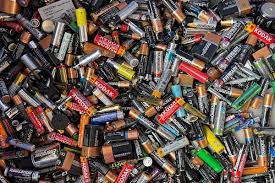Kia ora, My name is Jack Karetai-Barrett; I’m a year nine student at Whakatane High School, and this is my monthly zero waste column. Today, I’m writing about what’s involved in recycling batteries.
Used household batteries can be a big problem when it comes to recycling waste. They’re recyclable but aren’t allowed in our recycle bins – and throwing them in the rubbish means they are adding to the toxic soup that is landfill. But there are places you can bring your batteries to be recycled.
The batteries we use in everyday life are broken down into two separate categories: primary, (single use - can not be recharged) and secondary. (Rechargeable) lead-acid, nickel-cadmium, nickel-metal-hydride, and lithium-ion. Each type has a specific recycling method made for its elemental structure.
Battery recycling is a very important process that helps minimise the environmental harm while reducing the need for mining of natural resources. It begins with collection, where used batteries are gathered from various sources like E-waste, (Computers, rechargeable items, etc) vehicles, single use batteries, (non-rechargeables) industrial equipment.
Lead-acid batteries, (The ones they use in cars) go through a mechanical process to crush and separate their components. Lead is melted and purified for reuse, while plastic casings are melted and reformed. Nickel-cadmium and nickel-metal-hydride batteries go through a very high-temperature smelting process to recover metals like nickel, cobalt, and iron.
Lithium-ion batteries, which are known to be in electric cars, involve a multi-step approach. They are ripped into shreds, to get metals through a combination of mechanical and hydrometallurgical processes (In the case of batteries, hydrometallurgy is the use of water-based chemistry, for the recovery of metals, from recycled battery materials) These recovered materials are then used in the making of new batteries.
After the metals are extracted, they are refined and sent to companies to produce new batteries, reducing the demand for more natural metals to be mined. Properly recycling batteries prevents toxic substances from getting into our environment and minimises the need for mining, which can have big ecological impacts. It's an important step towards creating a more sustainable way of living for Humans.
In order to prevent the environmental destruction that mining causes just so we can have batteries, we need to properly recycle the batteries that we use. There is a cost to recycling batteries. And I think that sometimes people are put off by that. If we added the recycle cost to the purchase cost, then we could teach people that they have already paid for their recycling, and maybe they’d be more willing to bring in their batteries, rather than put them in the landfill. Then everyone can be a part of the solution, by bringing their waste to the right place. To recycle your batteries, you can bring them to Waste Zero, our stall at the Sunday Market, on the first Sunday of every month. or you can bring large car/truck batteries to the Whakatane Transfer and Recycling centre, Macaulay Metals, and Battery Town Whakatane. Bring all small single-use and rechargeable batteries to Waste Zero. Please do not put them in the landfill. Batteries in the landfill can be crushed and become damaged, which can cause them to heat up and catch on fire. These fires can destroy waste collection trucks, waste collection facilities, and cause incredibly damaging and toxic landfill fires. The next Waste Zero stand at the Sunday market will be on Sunday the 1st of October. As I write this Bunnings Whakatane are receiving household batteries for recycling with no cost attached. (For customers)





No comments:
Post a Comment